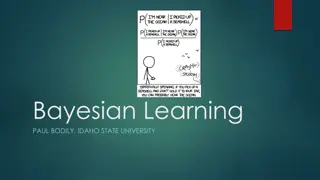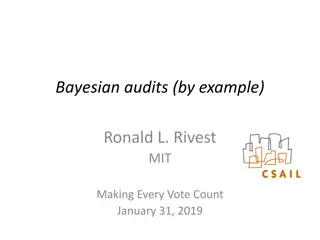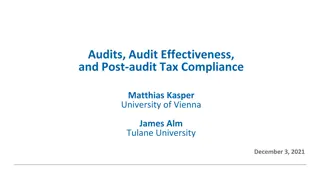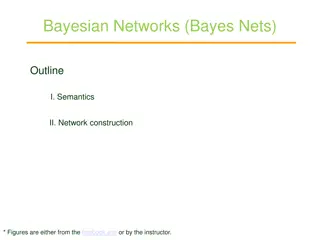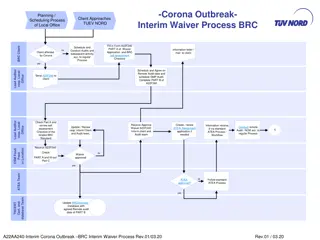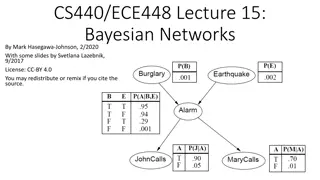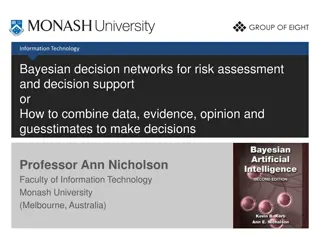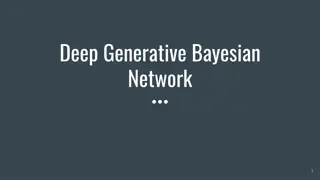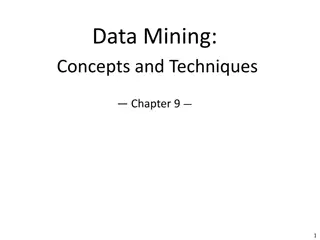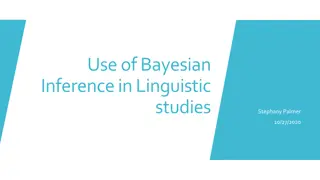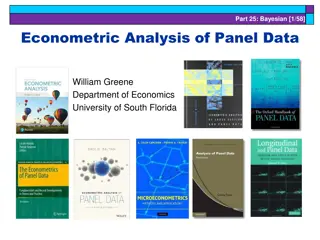Bayesian Learning in Machine Learning
Bayesian learning is a powerful approach in machine learning that involves combining data likelihood with prior knowledge to make decisions. It includes Bayesian classification, where the posterior probability of an output class given input data is calculated using Bayes Rule. Understanding Bayesian
1 views • 17 slides
Departmental Audits in GST
Departmental audits in GST involve the examination of records, returns, and other documents to verify the correctness of turnover declared, taxes paid, refunds claimed, and input tax credit availed. This audit ensures compliance with the provisions of the CGST Act, 2017. Types of audits under GST in
11 views • 27 slides
Bayesian Approach in Pediatric Cancer Clinical Trials
Pediatric cancer clinical trials benefit from Bayesian analysis, allowing for the incorporation of uncertainty in prior knowledge and ensuring more informed decision-making. The use of Bayesian methods in the development of cancer drugs for children and adolescents, as emphasized by initiatives like
0 views • 26 slides
Bayesian Audits in Election Processes
Bayesian audits, introduced by Ronald L. Rivest, offer a method to validate election results by sampling and analyzing paper ballots. They address the probability of incorrect winners being accepted and the upset probability of reported winners losing if all ballots were examined. The Bayesian metho
3 views • 7 slides
Safety Management Overview and Audits Report
Explore a detailed report on safety management practices, audits findings, and actionable insights in the BSEE office. Learn about prior audits, SEMS evaluations, CAP verification, and more. Dive into SEMS subpart O audits and API RP 75 guidelines for a comprehensive understanding of safety protocol
1 views • 18 slides
The Impact of Audits on Post-Audit Tax Compliance
Audits have direct and indirect effects on taxpayers, influencing compliance behaviors. While more audits generally lead to increased compliance, outcomes can be ambiguous, with some studies showing a decline in post-audit compliance. Behavioral responses to tax audits are driven by perceived risks
5 views • 15 slides
Bayesian Networks: A Comprehensive Overview
Bayesian networks, also known as Bayes nets, provide a powerful tool for modeling uncertainty in complex domains by representing conditional independence relationships among variables. This outline covers the semantics, construction, and application of Bayesian networks, illustrating how they offer
1 views • 17 slides
Impact of Audits on Tax Compliance: Insights from Research Studies
Studies conducted by researchers such as Erich Kirchler have explored the impact of audits on tax compliance. While audits generally have a positive effect on compliance, there are cases where they can backfire, leading to unintended consequences. High auditing levels may not always deter tax evasio
0 views • 14 slides
Interim Waiver Process for BRC Audits During Corona Outbreak
This content outlines the interim waiver process and scheduling procedures for local office client audits during the Corona outbreak. It includes steps for completing waiver applications, conducting remote audits, and handling certification extensions. The document also provides guidelines for remot
0 views • 11 slides
Supporting SAIs in Auditing SDGs: Reflections and Plans
SAIs play a crucial role in auditing SDGs to ensure high-quality audits of partnerships. Various SAIs and funding partners are actively involved in supporting this initiative. The story so far includes audits of preparedness and implementation of SDGs, with performance audits supporting 73 SAIs and
4 views • 14 slides
Bayesian Networks for Efficient Probabilistic Inference
Bayesian networks, also known as graphical models, provide a compact and efficient way to represent complex joint probability distributions involving hidden variables. By depicting conditional independence relationships between random variables in a graph, Bayesian networks facilitate Bayesian infer
1 views • 33 slides
Bayesian Decision Networks in Information Technology for Decision Support
Explore the application of Bayesian decision networks in Information Technology, emphasizing risk assessment and decision support. Understand how to amalgamate data, evidence, opinion, and guesstimates to make informed decisions. Delve into probabilistic graphical models capturing process structures
2 views • 57 slides
Deep Generative Bayesian Networks in Machine Learning
Exploring the differences between Neural Networks and Bayesian Neural Networks, the advantages of the latter including robustness and adaptation capabilities, the Bayesian theory behind these networks, and insights into the comparison with regular neural network theory. Dive into the complexities, u
2 views • 22 slides
Food Industry Perspective on 3rd Party Audits and Regulatory Inspections
Overview of regulatory inspections and 3rd party audits in the food industry from the perspective of Tim Ahn, Global Director of Quality & Food Safety at Mars Chocolate. The content covers the importance of inspections, differences between inspections and audits, and the role of audits in driving qu
1 views • 12 slides
Advanced Methods in Bayesian Belief Networks Classification
Bayesian belief networks, also known as Bayesian networks, are graphical models that allow class conditional independencies between subsets of variables. These networks represent dependencies among variables and provide a specification of joint probability distribution. Learn about classification me
5 views • 59 slides
Bayesian Data Analysis
Dive into Bayesian data analysis with a focus on Psychology applications. Learn about Bayesian inference, model parameters, Markov-Chain Monte Carlo, alternatives to NHST, and more. Explore tools like R, JAGS, Stan, and JASP through practical examples and tutorials. Enhance your skills in conducting
0 views • 35 slides
Bayesian Inference in Linguistic Studies: Exploring Data Analysis Methods
Use of Bayesian inference in linguistic studies for analyzing data. Understand the differences between frequentist and Bayesian probabilities. Learn about Bayes' Theorem, Bayesian inference process, and the importance of choosing priors carefully.
1 views • 20 slides
CSCI 5822 Probabilistic Models of Human and Machine Learning
In this resource, Mike Mozer from the University of Colorado at Boulder delves into Probabilistic Models of Human and Machine Learning, focusing on Bayesian Networks, General Learning Problems, Classes of Graphical Model Learning Problems, and more. The content covers learning distributions when net
3 views • 22 slides
Bayesian Optimization in Innovation: Key Strategies
Bayesian Optimization is an integrated methodology with the potential to drastically reduce time and resources for innovation. Through agile product development, it can lower R&D costs and expedite time-to-market. The iterative approach of Bayesian Optimization aligns well with the research and
0 views • 23 slides
Panel Data Econometric Analysis: Bayesian vs. Classical
This study delves into classical and Bayesian approaches in econometric analysis of panel data, focusing on modeling heterogeneity and discrete choice. It contrasts the classical and Bayesian methods, examining mixed logit models, random parameters modeling, and individual taste parameter estimation
4 views • 51 slides
Bayesian vs. Classical Econometric Analysis of Panel Data by William Greene
This study delves into the contrast between Bayesian and Classical estimation methods in the analysis of panel data by William Greene, exploring mixed logit models, random parameters modeling, and extensions of classical models. The study also discusses the relationship between mixed logit and Bayes
2 views • 8 slides
Bayesian Econometric Analysis of Panel Data: A Comprehensive Overview
This material delves into Bayesian econometric analysis of panel data, exploring Bayesian econometric models, relevant sources, software tools, philosophical underpinnings, objectivity vs. subjectivity, and paradigms in classical and Bayesian approaches. It discusses the use of new information to up
3 views • 58 slides
Bayesian Philosophy of Science and Confirmation Theory
This content delves into the Bayesian Philosophy of Science, focusing on the Bayesian Confirmation Theory (BCT). It discusses conditions of adequacy and representation theorems, showing how Bayesian Confirmation Theory can be applied by historians of science and scientists. The theory addresses para
1 views • 26 slides
Calibrated Bayesian Approach for Survey Inference
Explore the Calibrated Bayesian approach for sample survey inference, including understanding different modes of inference, mechanics of Bayesian inference, and incorporating survey design features. Learn about models for complex surveys and key aspects of survey inference methods. Gain insights int
1 views • 81 slides
Simulation Metamodeling with Dynamic Bayesian Networks
Explore the innovative use of Dynamic Bayesian Networks in Simulation Metamodeling for Decision Analysis and Multiple Criteria Evaluation, presented in Jirka Poropudas' thesis at Aalto University. The thesis delves into Bayesian Networks, Influence Diagrams, and Game Theory to enhance simulation mod
2 views • 18 slides
Bayesian Deep Learning on Quantum Computers
This presentation explores the application of Bayesian machine learning principles to deep neural networks on quantum computers. It discusses the advantages of Bayesian learning, uncertainty information, automated structure learning, avoiding overfitting, and resilience to attacks. The integration o
0 views • 19 slides
Tutorial on Learning Bayesian Networks for Complex Relational Data
This tutorial delves into the realm of Bayesian networks for complex relational data, exploring concepts like first-order Bayesian networks, learning models, extending network models, relational data and logic, and first-order logic terms. Discover how Bayesian networks support probabilistic frequen
2 views • 32 slides
Probabilistic Reasoning in Bayesian Networks: Insights & Calculations
Learn about conditional independence, Bayesian networks, global and local semantics, tree of inference calculations, and how to calculate probabilities in a Bayesian network example. Understand the fundamentals and intricacies of probabilistic reasoning. Dive into the world of Bayesian networks and
3 views • 9 slides
Bayesian Theory with Adaptive Dosing: A Seminar Overview
Explore the fundamentals of Bayesian theory and its applications in adaptive dosing with feedback mechanisms. Understand how Bayesian probability offers a unique perspective on probability as a measure of knowledge. Discover the origins and benefits of Bayesian statistics in various fields, includin
0 views • 17 slides
Belief Update in Bayesian Networks
Explore the concept of belief update in Bayesian networks, including exact inference, Bayesian network definition, independence, trees, and more. Learn about updating beliefs in trees and interpreting Bayesian networks.
3 views • 29 slides
Unveiling Bayesian Analysis: Insights from Dr. Hailey Banack
Delve into the world of Bayesian analysis with Dr. Ghassan Hamra as he explains the integration of prior knowledge, the significance of Bayesian methods over frequentist approaches, and the types of Bayesian priors. Discover how Bayesian methods enhance modeling with sparse data and handle complex p
2 views • 10 slides
Key Distinctions in Learning Bayesian Networks
In this tutorial from UAI 1999, important concepts in learning Bayesian networks are explored, such as complete vs. incomplete data, observed vs. hidden variables, parameters vs. structure learning, and more. The lecture covers an introduction to Bayesian statistics, learning parameters of Bayesian
0 views • 30 slides
Understanding Bayesian Analysis in Econometrics
Explore the concepts of Bayesian analysis in econometrics, including Bayesian estimation, inference, paradigms, and the interplay between objectivity and subjectivity. Discover how Bayesian methods update beliefs with new evidence, contrasting with classical inference approaches.
0 views • 77 slides
Graphical Model Learning Schema and Bayesian Networks in Relational Data
Explore the process of learning graphical models and Bayesian networks for complex relational data, including structure learning, lattice search techniques, and upgrading IID Bayesian network learners. Enhance your understanding of Bayesian network learning with detailed insights and examples.
4 views • 18 slides
Understanding Healthcare Reimbursement Audits and Appeals
Explore the essentials of healthcare reimbursement audits and appeals, including why providers are audited, the appeals process, response to overpayment demands, types of audits, commercial payor audits, audit triggers, regulations permitting audits, and more. Gain insights into the Medicare program
2 views • 18 slides
Bayesian Confirmation Theory and Prior-Posterior Dependence
Explore the Bayesian Philosophy of Science, Bayesian Confirmation Theory, and Prior-Posterior Dependence in this insightful discussion on probabilistic confirmation theory. Learn about the motivation behind Bayesian views, the role of probability in science, and the relationship between evidence, be
0 views • 26 slides
Understanding Bayesian Cognitive Modelling
Explore the concepts of Bayesian cognitive modelling, including building normative models, generating predictions, and comparing them with actual data. Discover functions amenable to Bayesian analysis and computational methods such as MCMC sampling and variational Bayesian approximation.
0 views • 33 slides
Understanding Bayesian Network Models
Explore the concept of Bayesian network models, which represent joint distributions using structured graphs to depict dependence and independence among random variables. Learn about the components, structure, and various examples of Bayesian networks, including scenarios involving marginal independe
0 views • 30 slides
Bayesian Estimation and Modeling Issues in Econometrics
Learn about Bayesian estimation in econometrics, including the specification of conditional likelihood, priors, posterior density, and computation of Bayesian estimators. Explore modeling issues, convergence of Bayesian and Classical MLE methods, and practical problems in sampling from joint posteri
0 views • 35 slides
Bayesian vs. Frequentists Overview
Explore the differences between Bayesian and Frequentist approaches in statistics. Learn about Bayesian methods, Bayes' Theorem, examples like landslides, definitions of posterior and prior probabilities, Bayesian modeling, informative vs. uninformative priors, and hierarchical Bayesian modeling. Di
0 views • 13 slides
